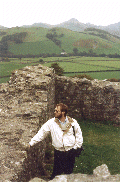
Art & Culture
various essays on, well, art and culture
Bookbinding & Conservation
lessons learned from this profession
Humor
ok, I'm not the guy from SNL,
but I still have a sense of humor
'Jim Downey' Stories
mostly true stories from my
adolescence
Personal Essays
more "it's all about me"
Politics
I’m at -7.13/-7.33 on The
Political Compass. Where
are you?
Society
observations on the human condition
Travel
Europe 1994
Kronach
Coburg
Vienna
Mödling
Vättis
Ramsgate
Chester
Wales 1998
Wales 2003
Wales 2006
CCGA Vignettes
|
Vättis
The trip across Austria was a joy for the body and soul. I love mountains,
and all along the way we were skirting the northern edge of the Alps, sometimes
in the foothills, sometimes winding through passes with snow-covered massifs on
either side. I'm not quite sure what I expected of the Alps. The
photos in my memory were of the heart of the Alps, mostly covered in glacier,
all ice and bare rock, maybe with a dot of village far down below in a swath of
green. Sure, when you think of Switzerland, the image is of steep hills,
evergreens and snow, snow, snow. But the reality of that long trip was both
less dramatic and more enjoyable. The foothills became steeper, with very
old rock peeking out more and more often. Plenty of cities, towns, and
villages all along the route, which mostly ran through agricultural areas,
frequently with the Inn river in sight. Deep and brilliant green throughout,
with occasional patches of corn or wheat ready to harvest.
The train was luxurious, the seats deep, plush,
and relaxing. We started with sun in Vienna, ran through patches of cloud
and rain as we went further west. I didn't mind, though it made it more
difficult for Alix to get any good pictures from the train.
Mid afternoon, we stopped in Innsbruck. We needed to change trains, and
with about an hour to kill thought that we would see a bit of the downtown.
Beautiful city, with mountains all around, reminding me a lot of Telluride,
Colorado. Of course, in the videos that we had seen, and the reading that
we had done on the topic of tourist traps in Austria, Innsbruck and the 'Golden
Roof' were always featured prominently. The midafternoon sun was well
hidden behind mountains, but the surrounding peaks were even more brilliant by
contrast.
My first surprise was that nothing was open.
Nada. All the stores close down for the weekend at noon on Saturday.
It was sorta fun to window shop as we walked through town, but it just felt unnatural
to have a weekend there and not be able to buy things. I know that it hasn't
been that long since the blue laws were changed in Iowa and Missouri, and I grew up
not being able to buy things on Sundays . . . but on Saturday?? It seemed
vaguely anti-capitalist, certainly un-American, and made me uneasy.
The second surprise was the increasing crowds
as we penetrated downtown. Since everything was closed, and it was too early
in the day for much of a nightlife, why on earth were there so many people there?
The downtown part of Innsbruck is not that big, and the press of people added to my
uneasiness. There was a market, of course, tucked away between a couple of
gothic churches, high-rise offices in the gaps. (European high rises . . .
sort of gothic style meets US Steel & glass. Weird.) But all the stalls
were being dismantled, the vendors cleaning up the spilled produce, their small cars
and not much bigger vans zipping hither and thither looking for enough space to park
so that they could be loaded. Finally, we passed through an archway between
buildings, and the ugly truth of why all those people were there sank in: there
was going to be a concert. And not just any concert. A 'Country-Western'
concert. Not my favorite music. Arrrrrgh!!!!!
Now I know how the European natives must feel when
they see the SCA folk play-acting in their castles. It was more than a little
weird. The keynote band was some American group that probably couldn't get a
gig in the Toledo Howard Johnson's on New Years eve . . . but here they were,
authentic American Country singers. Gods. At least to these folks with
all the affectations of the urban cowboy revival that I dislike so much back in the
states. As we pushed past the groupies who were longingly listening to the band
tune up and check levels, I felt myself starting to channel Hunter S. Thompson.
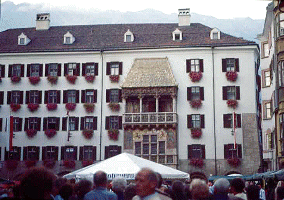 Fear & Loathing in Austria, and me caught without any drugs worth mentioning.
Lots of plastic cups of Bud, too many people wearing cheap Stetsons and plastic boots,
too many Marlboros being lit. My unease grew, I broke into a cold sweat, and
started to panic.
Fear & Loathing in Austria, and me caught without any drugs worth mentioning.
Lots of plastic cups of Bud, too many people wearing cheap Stetsons and plastic boots,
too many Marlboros being lit. My unease grew, I broke into a cold sweat, and
started to panic.
Alix saw the glaze start to settle over my eyes,
and took the lead. We got out of there, went to the Golden Roof, saw it, and
left pretty damned quick, trying to avoid the 'kicker-wannabes on the way back to
the station.
I'm sure that Innsbruck is a nice city, with real
culture, great shops, wonderful people. But I never want to stop there again.
Before getting on our connecting train I bought a couple of cans of good beer to take
along as a sedative. It helped, some.
The next train we took was unusual. Still a first-class, very nice luxury train,
but this one didn't have any cars with individual airline-style seats. All it
had were compartments to seat about 6, which could be converted into a couple of short
couches if you wanted to try and nap. We found one which was unoccupied, climbed
in, and enjoyed the view. It wasn't long before the sun set and night slipped
into the valleys, working it's way up the mountains until even the sky was dark.
We pulled down the blinds between the compartment and the hallway, and turned off the
interior lights. I slipped a piece of cardboard in front of the nightlight over
the door, and we allowed our eyes to adjust to the dark. It was wonderful to sit
there, looking out at the lights of the farms and small towns, watching the glow of the
lights from the other cars of the train bounce off the walls of rock in the passes.
At one point, as we wound high up the side of a mountain, we could only see the lights
of the train touch on the tops of trees below us, and down below enjoyed the view of
cars, little play cars they were so far below us, winding through the narrow roads
beside the river. It was at least a thousand feet down, and when we passed over
a gorge between mountains, the trestles of the bridge were nothing but dull brown
matchsticks, much too flimsy to support us. I found it exhilarating.
Alix wasn't amused. I didn't know that she didn't care that much for heights,
and said something about it. Her reply was that it wasn't heights she was
afraid of, but as an architect she had to wonder about those matchsticks holding us
up.
We rolled into our station on the eastern border of Switzerland, a medium sized
city by the name of Buchs. It was about 9 locally. An old family
friend of Alix's was there to meet us, take us home to visit his family for a
couple of days. His name was Robert.
Robert was genial, an attractive mid-40's with
an almost Mediterranean build and coloration, thick black hair with a touch of
grey here and there, and a bushy moustache likewise with a touch of grey.
His English wasn't bad, but it wasn't great . . . about on a par with my german.
Between us, with Alix jumping in now and again, we were able to communicate pretty
well, considering that we were a little bleary from the activities of the day
(which had started by hiking around the Castle Liechtenstein before it even opened)
and the length of the train ride. Robert wanted to know if we were hungry
or wanted to go out for a drink, or maybe see the sights a little before we drove
the half hour up to his home. "What sights?" I think I asked.
Well, it wasn't exactly the wrong question.
But we did get a quick drive through Liechtenstein, the country. Took about
four minutes to cross through it. Then we turned around and drove back.
It probably wouldn't have taken that long, but there was some kind of street festival
going on, and Robert had to dodge the various drunks and revellers, zigging and
zagging through an amazing concentration of Rolls Royces, Porches, and other
upper-end Euro luxury cars. This was Liechtenstein. Robert described
it as one big bank, with parties at night to celebrate all the wealth. Indeed,
most of the buildings we saw were banks of one variety or another. I got the
feeling that this is where the rich folks in Switzerland go to hide their money in
numbered accounts, since the rest of the world uses up all the numbered accounts
in their own country. Sort of like a land-locked Bahamas, though the per-capita
income is just a trifle higher.
Robert got us out of there, jumped onto an
autobahn, and took us towards his home. After a bit we got off the highway,
going through a smallish town that I can no longer recall clearly. Then it
was up the mountain. Really up, like the feeling of gravity shifted from my
butt to my back, and occasionally to my sides as we took the turns of each of the
switchbacks at typical European speeds. I was glad I was sitting in the
backseat, where the view wasn't so good. Alix was sitting up front, hand
squeezing a permanent impression into the grip on the door. No lights except
the headlights of the car. No guard rails for most of the time, either,
since these would only get in the way and cause problems when the snow slides off
the side of the mountain. I laughed nervously, trying to keep up the
conversation with Robert as he looked back to chat, hands pointing out various
bits of light in the valley below, as Alix became most silent. Few other
cars on the road, for which Alix and I were grateful, though it was clear that
Robert knew the road completely, thoroughly, instinctively. This was, after
all, the way he drove to work every day, and had for the last twenty-some years.
Ears popping from the change in pressure, after
a bit we got out of the car. It was cool, but the air had that mountain
cleanness, crispness, that I had only found well into the Sangre de Cristo range.
Moist, earthy, scent of pine, and cows. That's OK, I lived in Iowa long enough
that I got used to eau de cow. It was cloudy, so there wasn't much to see of
the sky or the mountain peaks around us, just a sense that they were there, a shadow
on the dark sky, too far away to see, too big to ignore.
We went inside to meet the family. Elspeth,
Robert's somewhat-younger wife, and their two boys, Robert (Jr., usually referred to
as Robbie) who was 7, and Mario, age 5. Elspeth speaks wonderful English
(and another half dozen languages besides), was charming and witty, and saved all
of us from having to resort to hand gestures for communication as we got too tired
to think. We sat up and chatted long enough to be sociable, but everyone
was tired and we soon turned in.
I awoke to that cool, fresh air, and the sound of hundreds of cowbells clanging slowly
outside our slightly open window. It was just a little after dawn, and the
cattle were being moved from one field to another. They had just been brought
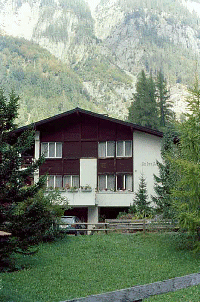 down from their summer pastures even higher up the slopes, and were still being
shuffled around town here and there. Out the window was a scene from a
storybook: a snow-dusted massif towering ahead, the blooming flowers of two
gardens between our window and the alpine neighbor's home, some forty or fifty feet
away. Sun on the edges of the mountain, clear, bright blue sky with just
enough puffy clouds to balance the challenge of the mountain peaks.
down from their summer pastures even higher up the slopes, and were still being
shuffled around town here and there. Out the window was a scene from a
storybook: a snow-dusted massif towering ahead, the blooming flowers of two
gardens between our window and the alpine neighbor's home, some forty or fifty feet
away. Sun on the edges of the mountain, clear, bright blue sky with just
enough puffy clouds to balance the challenge of the mountain peaks.
A delightful breakfast; strong coffee, fresh
breads, sharp, tangy cheeses, cold cuts of ham and sausage, fruit, butter, and
jams. And good conversation, getting to know this family. The boys
were a double handful, Robbie ever quiet but intense and very focused, Mario even
more intense but scattered, lively, zooming from one toy or topic to another.
After breakfast we went out for a little bit of
a walking tour of the village of Vättis, where we were. Robert is an
architect (hence the connection to Alix's family . . . he had come across Alix's
dad when he was exploring the States as a youth, wound up working for Hurst for
a year or so, and they had stayed in touch ever since), and we wanted to see some
of his work in the village and in nearby towns.
The village and surrounding mountains were as
picturesque as anything you can imagine. All around us were the peaks of
the mountains, bare of trees and even the slightest trace of grass, but not entirely
covered in snow yet. A little lower were the high meadows, still brilliant
green, slopes clear of trees except at the fringes, now empty of the cattle which
grazed there until recently. Lower still the trees started, but on the steeper
mountainsides they were missing, swept away by regular and repeated avalanches.
The village, holding maybe 400, was tucked into a narrow saddle between ridges,
mostly on level ground, with streets running along with the natural curve of the
topology. On the edges of the village, where the back yards butted up against
the side of the mountains, were some simple tripod arrangements of wooden beams.
I asked Robert what these were, as I had seen similar items from the train the day
before. He explained that they were designed to stop small avalanches from
starting and turning into big avalanches.
The houses were the typical Alpine style, mostly
square, with high-pitched roofs to shed snow, a substantial overhang, usually a
balcony or two. The overall impression was one of solidness. I didn't
realize just how solid until we stopped by a house being built, one that Robert had
designed. As we walked through the building, I was rather stunned at how
strong the thing was. The walls were all structural clay tiles . . . a
double layer, with insulation sandwiched between them, and a final coating of
heavy insulation would be applied like stucco to the outside when finished.
The floors were all slab concrete, about 8 inches thick. And I'm not talking
about just the basement floor . . . ALL the floors, on all three levels of the house,
were concrete slab. Even the stairs going up and down between the levels were
poured concrete. All the interior walls were also structural clay tiles.
I commented to Robert that the thing was built to withstand a bomb. He said no,
that the bomb shelter was downstairs.
Seriously. All homes built in Switzerland
must have a bomb shelter with at least one square meter of space for each person who
would be living in the house. Like commercial buildings here in the States,
the architect's plans for a home must be approved by a government review board,
and part of the building code specifies the size and construction of the bomb
shelter. Those specs are pretty rigorous, too. Robert took us down
into the basement and showed us the shelter. It had walls and ceiling of
reinforced concrete a couple of feet thick. It had a hand-cranked air
filtration system. It had self-contained water storage, and built-in
shelves for food and other supplies. It had a blast door that NORAD
would be proud of. Robert said that most families used their shelters
as pantries, or let the kids play in 'em as sort of a playhouse.
We got to talking about the pros and cons of
this kind of building. Having lived in cheap wooden frame houses all my
life, a house of that strength and durability impressed me. These were people
who were building things to last, good for several generations at least.
Robert pointed out that such strength comes with a much higher price tag . . . about
8 or 9 times what a comparable-size American home would cost. Alix added that
in an area of high geologic stability, such as Switzerland, clay tile houses are
fine, but in the States it would be begging for an earthquake to explode the
sucker. Such structures aren't very pliable, and react even worse than brick
or block homes when subject to ground movement.
But there, that style of building makes sense.
You need the strength to stand up to the weight and force of snow. Lumber is
more expensive, and it is harder to insulate a frame-built home in some regards.
And the bomb shelter fits in nicely with the Swiss mentality of protecting themselves
no matter what kind of stupidity the rest of the world chooses to engage in.
But it does present something of a problem for an architect; since the houses are
so well built, there are fewer of them being built. It isn't necessary to
replace the houses about every 50 years. And it is more difficult to do
renovation work, or to put on an addition. Robert liked the American way of
doing things, saying that it meant that we had to renew, reinvent our living space
every couple of generations the same way that we reinvent ourselves, our country,
our economy. We stay flexible, pliable, better able to roll with the movement
of the earth, like our most common houses. Not a bad way to be.
We also got to see a newly re-finished school for the village children that Robert
had designed, and went off on a driving tour of a number of other structures that he
had built. I like his architectural sense; clean lines, simple application of
relevant modern technology, an appreciation of the extant building and surrounding
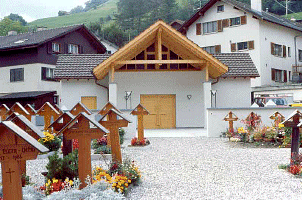 environment. A small community funeral chapel in the town of Valens echoed
the lodge-pole pines of the mountains and high pitched roofs of the houses, with a
tall front entry, the use of native woods in long vertical lines inside. A
little-bitty post office wedged into a pie-shaped space in another minuscule town
still seemed to be big, the front of the building protected by small, overlapping
escutcheons of cedar, giving a decorative effect not unlike the bark of a tree or
a suit of scale armour. All of the buildings were smart, sensitive to the
environment, both natural and built.
environment. A small community funeral chapel in the town of Valens echoed
the lodge-pole pines of the mountains and high pitched roofs of the houses, with a
tall front entry, the use of native woods in long vertical lines inside. A
little-bitty post office wedged into a pie-shaped space in another minuscule town
still seemed to be big, the front of the building protected by small, overlapping
escutcheons of cedar, giving a decorative effect not unlike the bark of a tree or
a suit of scale armour. All of the buildings were smart, sensitive to the
environment, both natural and built.
And the scenery! Each of the little towns
we stopped at was perched on the side of a mountain where there was a little bit of
a level place, or squeezed back between mountain ridges in a saddle like Vättis.
Everywhere cattle grazed, even where it looked to be too steep for a top-heavy,
four-legger to be able to stand. I suppose that you can't underestimate the
power of a cow to want strike out and explore, to seek out new pastures, to boldly
graze where no cow has fertilized before. A clear, bright day, cotton-ball
clouds occasionally colliding with the mountain peaks a ways up slope. Cool,
but the sunlight was pleasant and warm. And the curious combination of
emotions: feeling like you could see forever into the distance, but also that
the mountains afforded a defense, a protection from the rest of the world that
allowed the residents to go peacefully about their lives. And here and there
Robert would point out that the Swiss had augmented these natural defenses with
intelligent tactical defenses. He didn't put it in those terms, but rather
would just mention the defenses the way I would show a visitor some little aspect
of Columbia that I took completely for granted.
A trip up the main valley we were in brought us
to a large hydro-electric facility, part of a network of such dams, that demonstrated
this point perfectly. On either end of the road going across the top of the
dam, just where the road would turn to continue along the mountain, there were
hardpoints built back into the rock. These were classic pillboxes, accessible
only from tunnels deep in the mountains, heavily built and shielded to afford the
greatest protection but also the best field of fire across the dam and particularly
where an enemy would have to expose a vulnerable side to direct attack. It
was completely analogous to the gate defenses that we had seen in several castles,
and gave a very nice insight into the way the Swiss think about their country:
the whole thing is a castle, layers of defense, protection, and safety, but almost
all of it based on a dispersed, non-centralized system. An aggressor couldn't
defeat the country by defeating the government, as the Cantons and local councils
could continue to function almost without interruption. We hear a lot of
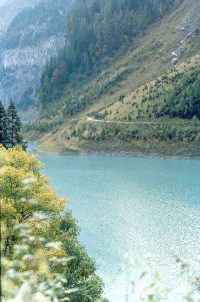 Swiss independence and neutrality, as if these were luxuries that the rest of the
world can't quite understand. But go there, and it makes sense. The
country isn't isolated so much as it is a separate place, a haven of safety and
security. Little wonder that the Swiss, as diverse as they are (they have
four official languages, reflecting the four major European influences: German,
French, Italian, and living Latin) share this collective sense of culture and
country. It is their home, and everything outside of their home is less
safe, more than a little threatening.
Swiss independence and neutrality, as if these were luxuries that the rest of the
world can't quite understand. But go there, and it makes sense. The
country isn't isolated so much as it is a separate place, a haven of safety and
security. Little wonder that the Swiss, as diverse as they are (they have
four official languages, reflecting the four major European influences: German,
French, Italian, and living Latin) share this collective sense of culture and
country. It is their home, and everything outside of their home is less
safe, more than a little threatening.
Upstream, at the far end of the incredibly blue
mountain lake caused by the dam, is a wonderful little living history type of place
called St. Martin. It is a typical early settlement of, say, about 1500.
What is there today is a little chapel (complete with a bell that Mario loved to
ring), a couple of small farmsteads, and a rustic little restaurant that specialized
in wood-fired bread baking. This is also a jumping-off point for several
hiking trails up into the deep mountains. To get to St. Martin we had to use
a 'timed' road: it was only a single lane, and so was one way . . . a different
direction each half hour. Signs at the beginning and end of the road told when
it was safe to start in that direction, and then for only the first 20 minutes of each
period, allowing the last 10 minutes for traffic to pass through. We looked
around, watched the boys play for a bit, had a snack in the restaurant, and got out
before the end of the half-hour allotted for traffic going our way.
We stopped off at home for a light lunch with
Elspeth. Afterwards, Robert took a nap, the boys went off to play with the
neighbor kids, and Alix, Elspeth and I sat out on the patio in the sun, sipping
drinks, enjoying the surrounding mountains, chatting. Elspeth clearly enjoyed
the opportunity to hone her English, which was, as I had mentioned before, quite
good. We talked politics, cultural differences. She is well educated,
well travelled, thoughtful and insightful, an excellent host and I'm sure companion
and mother. It was a relief to be able to sit there and think and talk
completely in English, relaxed and casual.
Following lunch, Alix, Robbie, Robert and I got
back in the car and went down to the small town of Sargans, a spa/resort town that
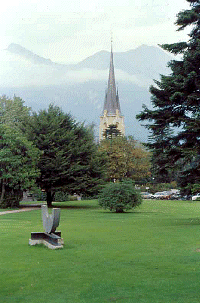 Robert wanted to show us. A charming little town, much like Coburg or Kronach,
but with higher mountains surrounding it. The area of town where the resort
hotels were located was very nice, the collective grounds for several of the hotels
like a park, complete with walking paths, lawn sculpture, fountains, and incredibly
beautiful flowers and plants. Robbie ran and played, climbed on the sculpture,
watched with intense longing a group of adults playing miniature golf. We
circled the hotels, Alix and Robert engaged in the occupational game of redesigning
the buildings, with a running commentary of what worked and didn't. I'm used
to this game, and have even become pretty good at it, if I say so myself.
Robert wanted to show us. A charming little town, much like Coburg or Kronach,
but with higher mountains surrounding it. The area of town where the resort
hotels were located was very nice, the collective grounds for several of the hotels
like a park, complete with walking paths, lawn sculpture, fountains, and incredibly
beautiful flowers and plants. Robbie ran and played, climbed on the sculpture,
watched with intense longing a group of adults playing miniature golf. We
circled the hotels, Alix and Robert engaged in the occupational game of redesigning
the buildings, with a running commentary of what worked and didn't. I'm used
to this game, and have even become pretty good at it, if I say so myself.
Robbie got tired and wanted to leave, much to
my relief. I was tired of walking, too, and hadn't taken enough advil to blunt
the throbbing of my knee. Getting back in the car as the sun disappeared behind
the low ridge to the west, we went back up to Vättis, arriving in the early
twilight of evening. Elspeth had dinner ready for us, and afterwards we sat
and relaxed and talked in the front room as the boys watched some dubbed American
show on the TV. I broke out the bottle of champagne that I had hauled all
over the continent, and asked our hosts to share it with us, since this was our
anniversary. When that bottle was gone, and other drinks enjoyed, we retired,
weary but very much refreshed from spending time with friends, in a home, rather
than a sterile hotel room.
The next morning we had an early train to
catch. Following another delightful breakfast, Robert and the boys took us
down to the station in Buchs. Just as the sun was clearing the eastern
mountains, we got on the train, found our seats, and settled in for the trip down
the Rhine valley. Mario and Robbie waved frantically from the parking lot
as we pulled away.
There isn't a lot to say about the train trip down the Rhine. It was beautiful,
of course, and the number of castles we were able to spot using our big Rand McNally
map as a guide was most impressive. But mostly it was too fast, too long,
and made me want to go back and spend at least a few days on a Rhine cruise, stopping
whenever the mood struck to investigate a particularly promising or picturesque
castle or winery. As we went north we ran into occasional rain, until we
came into Cologne in the midst of a raging storm just at eveningtime.
Getting off the train, we went into the ticket
office to investigate options for getting over to Britain. Weighing our
choices, we decided to stay in Cologne, get a good night's sleep and an early
start, make the passage to Ramsgate the next day. The weather was so ugly
outside that we just got a room at the hotel there in the train station, dropped
off our bags, and went out, as bundled up as we could get, small travel umbrellas
our defense against the blasting rain, to tour the city a little.
It wasn't exactly a dismal failure, but it was
pretty close. A very strong cold front was moving through, and our clothes
and umbrellas just weren't up to the challenge. Anyone with any sense was
indoors, while we were trying to walk about and get to see some of the city.
The plaza with the great cathedral was just across from the bahnhof, but the winds
swirling around the dom meant that there was little chance of staying out of the
rain, less chance of staying out of the spray, and no chance of staying warm.
We made one trip around the cathedral, oohing & ahhing, and called it quits.
We went up to our room and changed into dry clothes, went to the nice restaurant there
in the station for a late dinner. Funny thing, as we enjoyed dinner, drinks,
and dessert, we sat there at the plaza level with an excellent (and dry) view of the
cathedral.
We made a foray out into the shopping-mall
concourse of the station, picked up postcards, drinks, and went back to the room to
write friends and turn in early.
The morning was bright and cold. The front had moved through, leaving the
hard rain of the night before only a damp memory tucked away in the waterproof
laundry compartments of our luggage. We put on as many layers of clothes
as we could comfortably wear. I was regretting not having brought some
lightweight long underwear, and would not make the same mistake again when
travelling overseas.
We stopped off at a kiosk in the station for
coffee and breakfast pastries, and went out to see what we could of the city by
daylight before we had to catch our train to Öostende. A walk around
the cathedral just after dawn did wonders to my mood, even though the cathedral
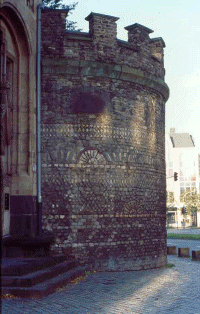 itself didn't open until 7, and the souvenir shops and antiquities museum there
nearby wouldn't open before we had to be on our train. But we got pictures
of the dom, and of the stone gateway that was also there on the plaza. This
was a remnant of the Roman period of the city, when it was still just a far-flung
colony of the empire. Our guide books said that there was a Roman tower
and parts of the old Roman city wall just a few blocks away, so we decided to go
see those also.
itself didn't open until 7, and the souvenir shops and antiquities museum there
nearby wouldn't open before we had to be on our train. But we got pictures
of the dom, and of the stone gateway that was also there on the plaza. This
was a remnant of the Roman period of the city, when it was still just a far-flung
colony of the empire. Our guide books said that there was a Roman tower
and parts of the old Roman city wall just a few blocks away, so we decided to go
see those also.
Fascinating. The Romans used brick for
making these structures, a contrast to the stone walls and castles that we had seen
all over the continent. And they incorporated designs into the brickwork;
geometric patterns which were given added contrast by painting. The section
of wall was a little below street level, and the old, squat tower had buildings
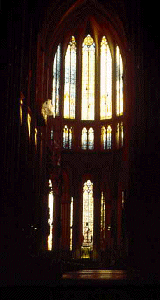 butted up to it on two sides, and was evidently still in use for some sort of
private residence. Still solid, still waiting for the return of the guard.
butted up to it on two sides, and was evidently still in use for some sort of
private residence. Still solid, still waiting for the return of the guard.
We hiked back to the cathedral, and got there
just as it was opened up for the day. After already spending time in
cathedrals and churches large and small, I was ready for this. I'm not
sure if I would have been had we come there first. It was so immense,
so powerful, the perfect example of what gothic architecture could accomplish
(even though it took hundreds of years to finish the structure . . . getting it
done this century) with scale, space, and the sheer weight of stone & glass.
It was a marvel of light inside, helped by the newly-risen sun, just as it had
been designed. And here, all that glittered really was gold, or at least
gilded with real gold. And there was a lot that glittered, from the angels
on the ceilings to the saints standing sentry over the alters. Stunning.
We took pictures. We gawked. We sat, impressed at the vision and
power of faith. We left in a hurry to check out of the hotel and catch the
train to Öostende and through to Ramsgate.
|
|

